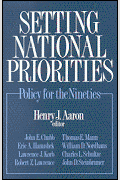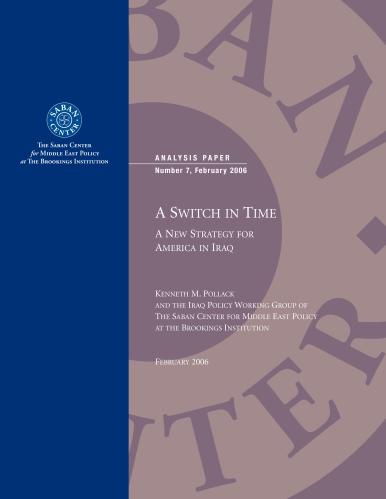In his radio address to the nation on July 24, 1933, four months into his presidency, President Franklin D. Roosevelt reflected on “the crowding events of the hundred days which had been devoted to the starting of the wheels of the New Deal.” He was referring specifically to the one hundred day special session of the 73rd Congress that he had called and which passed 15 major pieces of legislation in response to the dire economic situation.
The first hundred days has continued to serve as a benchmark for many presidents since Roosevelt. As President Donald Trump begins his administration, this blog will present, on a weekly basis, a selection of what Brookings experts are writing and saying about the new administration’s early policy choices, personnel decisions, and engagements with domestic and global events.
To receive daily updates on new Brookings research, commentary, and events, subscribe to our newsletters.
THE INAUGURATION
Bill Galston writes that President Trump’s inaugural address shows that he is “dead serious” about his campaign pledge to “Make America Great Again,” and that we all “must hope that the intensity of his commitment remains compatible with the constitutional institutions and norms that even the most populist president always must respect.”
DOMESTIC AND ECONOMIC POLICY
Joseph Kane notes that today’s unemployment rate for construction workers is near pre-recession levels, and thus a massive infrastructure plan is unlikely to boost infrastructure jobs.
On February 7, the Hamilton Project at Brookings hosts a policy forum to explore fiscally responsible policy options for funding infrastructure investments.
Devashree Saha and Sifan Liu of the Metropolitan Policy Program explain why President Trump has made what they call empty promises to make the coal industry great again, largely because automation has been eating into coal jobs for a long time.
Nicole Turner-Lee argues that Attorney General nominee Jeff Sessions “has a troubling past with regard to voting rights,” and that the next attorney general pick “will be more important than ever and the choice will determine whether we truly want to be a nation less divided.”
Dayna Bowen Matthew, Richard V. Reeves, and Edward Rodrigue, in a new paper, show how black Americans have been disadvantaged, and write that racial justice “ought to be at the top of the agenda” for the new administration.
Melissa Rogers offers four ways the new administration can apply the constitutional principles on religion embodied in the First Amendment and Article VI, principles that “have helped us to become a nation with remarkable religious vitality and diversity as well as healthy cooperation across faiths and beliefs.”
Bessma Momani, a nonresident fellow with the Brookings Doha Center, says that the Trump administration’s expected lowering of Dodd-Frank financial regulations combined with global money flowing into the U.S. in search of higher interest rates might return us to the same conditions present on the eve of the financial crisis.
Cameron Kerry and Alan Raul argue that while the Trump administration changes trade relations with China and other countries, the Obama executive order that extends some privacy rights to “ordinary” foreign citizens “should not be on the chopping block because it is vital to transatlantic digital trade and ecommerce.”
FOREIGN POLICY/NATIONAL SECURITY
Daniel Byman, writes that “Trump’s foreign policy assumptions fly in the face of many traditional U.S. policy approaches and the preferences of powerful bureaucracies,” and considers seven assumptions the emerging Trump foreign policy team appears to hold.
Senior Fellow Michael O’Hanlon and James Steinberg, a Syracuse University professor (and former Brookings scholar), say that “while there is ample reason to be concerned about trends, we would contend that the state of U.S.-China security relations is a glass half full. It is important that both sides make maximum efforts to stabilize the security relationship, lest tensions in both the economic and security dimensions feed on each other, and the risks of rivalry and conflict deepen.”
Senior Fellows Josh Meltzer and Mireya Solís say that President Trump’s action to withdraw the U.S. from the Trans-Pacific Partnership undercuts U.S. leverage with China and is a “blow to US global leadership in determining the rules for international trade and investment in the Asia-Pacific region.”
Brookings India Fellow Dhruva Jaishankar says it’s “hard to see who exactly benefits from the United States’ withdrawal from TPP,” and for India, the trade pact “offered the best hope for a more openly competitive international trade order from which India … still has possibly the most to gain.”
Senior Fellow Robert Kagan, calls this time the “twilight of the liberal world order,” says that “this new approach in American foreign policy is likely to hasten a return to the instability and clashes of previous eras.”
Tamara Cofman Wittes, senior fellow and director of the Center for Middle East Policy at Brookings, cautions the new Trump administration to avoid swift action on foreign policy decisions, saying that “wise policy officials will insist that they slow their decision-making process down enough to question, and perhaps even repent, some of their assumptions. If they don’t do it for themselves now, the world will undoubtedly do it for them over time.”
Senior Fellow Kenneth Pollack discusses some of the many reasons why it would be a terrible idea for the Trump administration to “take” Iraq’s oil, and instead talk about “a more realistic Iraq policy.”
For more details policy recommendations and analyses from Brookings experts for the new administration, see “Brookings Big Ideas for America” on issues including the threatened middle-class dream in America, health care, criminal justice reform, infrastructure, U.S. alliances, nuclear weapons, terrorism, and regional conflicts.




Commentary
President Trump’s First 100 Days: What Brookings experts are saying, 1/27/17
January 27, 2017